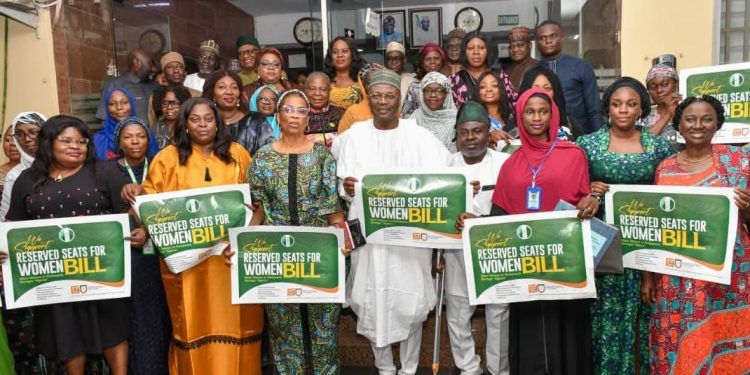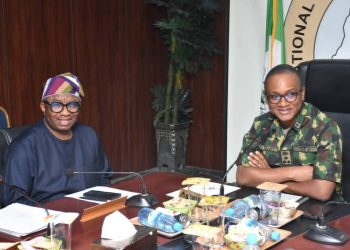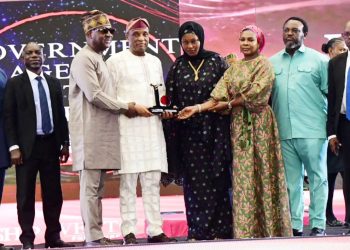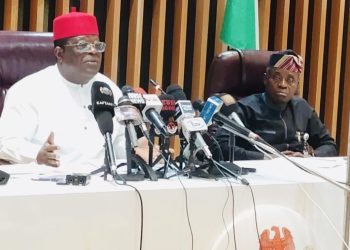By Nkechi Eze
A coalition of women civil society organizations, political party members, religious associations, and gender advocates, under the umbrella of The Electoral Hub and the Women’s Collective, on Wednesday, September 17, 2025, visited the Independent National Electoral Commission (INEC) headquarters in Abuja to press for stronger action on women’s political representation in Nigeria.
The advocacy engagement, which came just days after the commemoration of the International Day of Democracy on September 15, centred on the urgent passage and implementation of the 2025 Reserved Seats for Women Bill. The Bill seeks to guarantee additional seats for women in the National Assembly and State Houses of Assembly, addressing what campaigners describe as chronic underrepresentation in Nigeria’s political system.
Speaking during the visit, the Director of The Electoral Hub, Princess Hamman-Obels, explained that the advocacy aimed not only at pushing for the Reserved Seats Bill but also at forging practical partnerships with INEC. She stressed the need for collective strategies to increase women’s participation in elective positions and party leadership, adding that INEC’s gender and inclusivity initiatives must be strengthened through collaboration with women’s platforms.
“We want to ensure that the Reserved Seats Bill moves beyond promise into actionable reality,” Hamman-Obels said, noting that women’s voices in legislative processes and governance remain too muted. She urged INEC to work with civil society on mobilization, education, and practical reforms to make the bill’s implementation a success.
The delegation emphasized that INEC’s role will be pivotal if the bill is passed. Beyond conducting elections for the reserved seats, the Commission will be tasked with creating special constituencies across the 36 states and the Federal Capital Territory, as well as rolling out voter education programmes to help citizens understand the new system and its impact on representative democracy.
Responding, INEC Chairman, Professor Mahmood Yakubu, described the visit as “timely,” noting its symbolic closeness to Democracy Day celebrations. He pointed to progress the Commission has made in gender inclusivity, highlighting that women currently lead 55 per cent of INEC’s departments and directorates at its Abuja headquarters. He also referenced the creation of INEC’s Gender and Inclusivity Department, the revision of the Commission’s Gender Policy, and its annual celebration of International Women’s Day since 2024 as evidence of commitment.
However, Professor Yakubu admitted that the road to gender parity remains long. “The most effective means to achieve gender balance is affirmative action anchored in constitutional and legal reforms,” he said. He encouraged advocates to leverage the ongoing review of the 1999 Constitution and the Electoral Act 2022 to secure enforceable legal provisions that guarantee women’s representation. He reassured the delegation of INEC’s support, affirming: “You should continue to count on the Commission’s partnership at all times.”
Ambassador Nkoyo Toyo, who led the Women’s Collective, commended INEC’s openness and warm reception but warned that systemic barriers within Nigeria’s political culture continue to hinder women’s participation. She pointed out that political parties remain the gatekeepers of political space and often relegate women to tokenistic positions such as “woman leader,” which limit their influence.
Toyo stressed that reforms must target accountability within political parties—both established and newly registered—so that inclusivity can become a real value rather than a slogan. Drawing lessons from other democracies, she reminded the gathering that voluntary quotas, legal mandates, and strong party reforms are proven strategies to advance women’s representation worldwide.
Other members of the delegation, including Professor Jibrin Ibrahim and Adaora Jack, echoed these sentiments. They called for deliberate legislative and institutional measures to dismantle the entrenched barriers confronting women, youth, and persons with disabilities in Nigeria’s democratic process.
The advocacy visit, stakeholders agreed, represents a step toward a broader coalition between civil society and INEC. With the Reserved Seats for Women Bill now gaining momentum, the push is for the proposal to become a transformative policy that expands women’s voices in governance, accelerates inclusivity, and deepens Nigeria’s democracy.

















